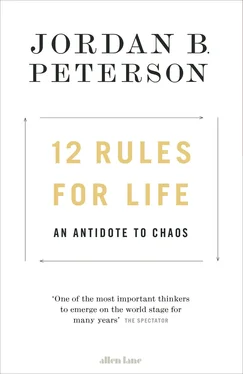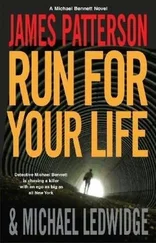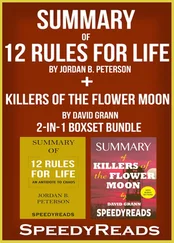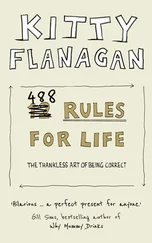Considering nature as purely static produces serious errors of apprehension. Nature “selects.” The idea of selects contains implicitly nested within it the idea of fitness . It is “fitness” that is “selected.” Fitness, roughly speaking, is the probability that a given organism will leave offspring (will propagate its genes through time). The “fit” in “fitness” is therefore the matching of organismal attribute to environmental demand. If that demand is conceptualized as static—if nature is conceptualized as eternal and unchanging—then evolution is a never-ending series of linear improvements, and fitness is something that can be ever more closely approximated across time. The still-powerful Victorian idea of evolutionary progress, with man at the pinnacle, is a partial consequence of this model of nature. It produces the erroneous notion that there is a destination of natural selection (increasing fitness to the environment), and that it can be conceptualized as a fixed point.
But nature, the selecting agent, is not a static selector—not in any simple sense. Nature dresses differently for each occasion. Nature varies like a musical score—and that, in part, explains why music produces its deep intimations of meaning. As the environment supporting a species transforms and changes, the features that make a given individual successful in surviving and reproducing also transform and change. Thus, the theory of natural selection does not posit creatures matching themselves ever more precisely to a template specified by the world. It is more that creatures are in a dance with nature, albeit one that is deadly. “In my kingdom,” as the Red Queen tells Alice in Wonderland, “you have to run as fast as you can just to stay in the same place.” No one standing still can triumph, no matter how well constituted.
Nature is not simply dynamic, either. Some things change quickly, but they are nested within other things that change less quickly (music frequently models this, too). Leaves change more quickly than trees, and trees more quickly than forests. Weather changes faster than climate. If it wasn’t this way, then the conservatism of evolution would not work, as the basic morphology of arms and hands would have to change as fast as the length of arm bones and the function of fingers. It’s chaos, within order, within chaos, within higher order. The order that is most real is the order that is most unchanging—and that is not necessarily the order that is most easily seen. The leaf, when perceived, might blind the observer to the tree. The tree can blind him to the forest. And some things that are most real (such as the ever-present dominance hierarchy) cannot be “seen” at all.
It is also a mistake to conceptualize nature romantically. Rich, modern city-dwellers, surrounded by hot, baking concrete, imagine the environment as something pristine and paradisal, like a French impressionist landscape. Eco-activists, even more idealistic in their viewpoint, envision nature as harmoniously balanced and perfect, absent the disruptions and depredations of mankind. Unfortunately, “the environment” is also elephantiasis and guinea worms (don’t ask), anopheles mosquitoes and malaria, starvation-level droughts, AIDS and the Black Plague. We don’t fantasize about the beauty of these aspects of nature, although they are just as real as their Edenic counterparts. It is because of the existence of such things, of course, that we attempt to modify our surroundings, protecting our children, building cities and transportation systems and growing food and generating power. If Mother Nature wasn’t so hell-bent on our destruction, it would be easier for us to exist in simple harmony with her dictates.
And this brings us to a third erroneous concept: that nature is something strictly segregated from the cultural constructs that have emerged within it. The order within the chaos and order of Being is all the more “natural” the longer it has lasted. This is because “nature” is “what selects,” and the longer a feature has existed the more time it has had to be selected—and to shape life. It does not matter whether that feature is physical and biological, or social and cultural. All that matters, from a Darwinian perspective, is permanence—and the dominance hierarchy, however social or cultural it might appear, has been around for some half a billion years. It’s permanent. It’s real. The dominance hierarchy is not capitalism. It’s not communism, either, for that matter. It’s not the military-industrial complex. It’s not the patriarchy—that disposable, malleable, arbitrary cultural artefact. It’s not even a human creation; not in the most profound sense. It is instead a near-eternal aspect of the environment, and much of what is blamed on these more ephemeral manifestations is a consequence of its unchanging existence. We (the sovereign we , the we that has been around since the beginning of life) have lived in a dominance hierarchy for a long, long time. We were struggling for position before we had skin, or hands, or lungs, or bones. There is little more natural than culture. Dominance hierarchies are older than trees.
The part of our brain that keeps track of our position in the dominance hierarchy is therefore exceptionally ancient and fundamental. [18017] A brief summary: Ziomkiewicz-Wichary, A. (2016). “Serotonin and dominance.” In T.K. Shackelford & V.A. Weekes-Shackelford (Eds.). Encyclopedia of evolutionary psychological science , DOI 10.1007/978-3-319-16999-6_1440-1. Retrieved from https://www.researchgate.net/publication/310586509_Serotonin_and_Dominance
It is a master control system, modulating our perceptions, values, emotions, thoughts and actions. It powerfully affects every aspect of our Being, conscious and unconscious alike. This is why, when we are defeated, we act very much like lobsters who have lost a fight. Our posture droops. We face the ground. We feel threatened, hurt, anxious and weak. If things do not improve, we become chronically depressed. Under such conditions, we can’t easily put up the kind of fight that life demands, and we become easy targets for harder-shelled bullies. And it is not only the behavioural and experiential similarities that are striking. Much of the basic neurochemistry is the same.
Consider serotonin, the chemical that governs posture and escape in the lobster. Low-ranking lobsters produce comparatively low levels of serotonin. This is also true of low-ranking human beings (and those low levels decrease more with each defeat). Low serotonin means decreased confidence. Low serotonin means more response to stress and costlier physical preparedness for emergency—as anything whatsoever may happen, at any time, at the bottom of the dominance hierarchy (and rarely something good). Low serotonin means less happiness, more pain and anxiety, more illness, and a shorter lifespan—among humans, just as among crustaceans. Higher spots in the dominance hierarchy, and the higher serotonin levels typical of those who inhabit them, are characterized by less illness, misery and death, even when factors such as absolute income—or number of decaying food scraps—are held constant. The importance of this can hardly be overstated.
There is an unspeakably primordial calculator, deep within you, at the very foundation of your brain, far below your thoughts and feelings. It monitors exactly where you are positioned in society—on a scale of one to ten, for the sake of argument. If you’re a number one, the highest level of status, you’re an overwhelming success. If you’re male, you have preferential access to the best places to live and the highest-quality food. People compete to do you favours. You have limitless opportunity for romantic and sexual contact. You are a successful lobster, and the most desirable females line up and vie for your attention. [18018] Janicke, T., Häderer, I. K., Lajeunesse, M. J., & Anthes, N. (2016). “Darwinian sex roles confirmed across the animal kingdom.” Science Advances, 2 , e1500983. Retrieved from http://advances.sciencemag.org/content/2/2/e1500983
Читать дальше












